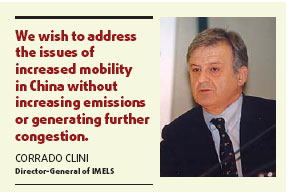Sustainable growth a highlight of cooperation
 SHANGHAI: At a pavilion in the campus of Tongji University, one of the best universities in China, a selection of Italy's most prestigious and beautiful cars and motorbikes have been put up on gleaming display.
SHANGHAI: At a pavilion in the campus of Tongji University, one of the best universities in China, a selection of Italy's most prestigious and beautiful cars and motorbikes have been put up on gleaming display.
Ferrari and Ducati: all the super-names of speed and auto-finesse have wowed an adoring crowd. However, on May 28, Professor Wan Gang of Tonji University signed an exclusive protocol on scientific research for a completely different kind of Italian auto-machine: a "hybrid moped."
"Tongji University is a center of excellence for the study of hybrid technology and energy efficiency," explained Corrado Clini, director-general of the Italian Ministry for the Environment, Land and Sea (IMELS). "And Italy and China have come together to develop environmentally friendly technologies for sustainable mobility."
According to Clini, who received the go-ahead for the moped's development from the Chinese government in 2005, the focus of the project is to reduce emissions by creating electric and hybrid vehicles with two or three wheels.
"Our objective is to reach a reduction of about 60 percent in energy consumption with these new vehicles, and about the same percentage again in carbon emission reductions," he told China Daily.
This exciting cooperation between Italian and Chinese minds was further strengthened in April last year, when Clini and his Chinese counterparts established the "Sino-Italian Sustainable Urban Mobility Research Center" at Tongji University.
"We wish to address the issues of increased mobility in China without increasing emissions or generating further congestion," explained Clini. "Our development of these hybrid mopeds is exclusively for sale in China, although there could be an opportunity to go into the European market if the product becomes successful."
Clini confirmed that the hybrid moped project will be ready by the end of 2009, and should be in operation in time for the 2010 Shanghai Expo
The project, which has a budget of $7.5 million over three years and been co-funded by IMELS with $3.7 million, marks yet another successful chapter in Italian cooperation with researchers from Tongji University. A total of 100 prototype vehicles will be developed initially, with more on the way should the project become successful.
"We now have almost 80 programs in the energy and transportation sectors, " says Clini of IMELS cooperation in China.
The Sino-Italian Cooperation Program, which was established in 2000, aims to encourage the blending of Italian technology and know-how with the innovative sciences of China's best researchers. A permanent Sino-Italian task force, based both in Beijing and Shanghai, is now well established. The key aim of IMELS is to create positive solutions for China's sustainable development, while also supporting the Italian industrial community's drive for research into new fuels and development.
Other key projects implemented in Shanghai since 2004 include research into atmospheric pollution, sustainable development plans for Chongming Island, innovative systems for solid waste collection, and the general promotion of hybrid technology, renewable energies and overall energy efficiency.
(China Daily 06/05/2007 page26)














